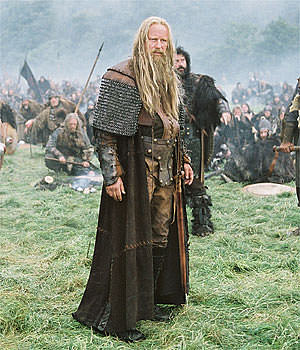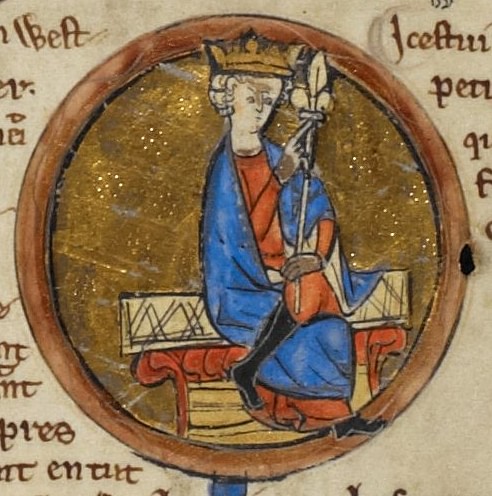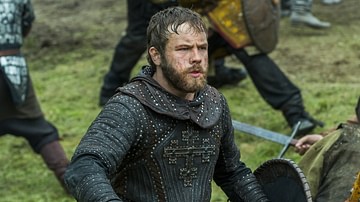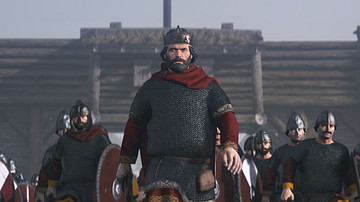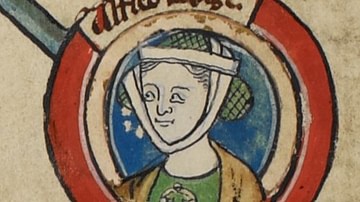
The Kingdom of Wessex (c. 519-927 CE or c. 519-1066 CE) was a political entity founded by the West Saxon Chieftain Cerdic (r. 519-540 CE) in 519 CE in the Upper Thames Valley of modern-day Britain which would later evolve into the modern nation. The difference in dates concerning the end of the kingdom has to do with whether one accepts the final year as coinciding with Athelstan of Wessex becoming King of England in 927 CE (and uniting all the kingdoms under his rule) or prefers the date of the Norman Invasion of England of 1066 CE when William the Conqueror arrived. There is no consensus on one date being more accurate than the other in scholarly circles but after Athelstan became King of England, the Kingdom of Wessex ended as an independent polity and so 927 CE should be recognized as its end-date.
The early history of the kingdom is marked by frequent conflict with the neighboring Kingdom of Mercia which continued until the reign of King Egbert (also given as Ecgberht, r. 802-839 CE) who conquered Mercia and annexed their lands. Wessex continued to prosper under Egbert's successors and reached its height under Alfred the Great (r. 871-899 CE).
Alfred's reforms would transform Wessex into the most powerful and effective kingdom in Britain and his son Edward the Elder (r.899-924 CE) would continue his policies and extend Wessex's power further. By the time Edward's son Aethelstan succeeded him in 924 CE, the ruler's title had changed from King of Wessex to King of the Anglo-Saxons because of the vast territory now under Wessex's control. Aethelstan would rule in this position between 924-927 CE when he became powerful enough to be declared the first King of England (r. 927-939 CE).
Wessex is featured in the TV series Vikings which follows a fictionalized version of the reigns of Egbert, Aethelwulf, and Alfred the Great and their struggles with the Viking invasions. The series is intended as entertainment, not history, and so departures from historical fact are to be expected; even so, audiences should be aware that the characters on the show often wildly depart from their historical counterparts.
Name & Legendary History
The name `Wessex' derives from `Kingdom of the West Saxons' but the original place name was Gewisse (after the Anglo-Saxon tribe who lived there) which scholars have linked to the German `gewiss' (meaning `certainly' or `sure') which was the same in Old Saxon. According to these scholars, the region of Gewisse was so-named because of Cerdic and his early association with the area.
The Anglo-Saxon Chronicles give 495 CE as the date Cerdic first arrived in the land with his son and army but specify that he landed at a place known as `Cerdic's ore'. According to recent scholarship, it may be that Cerdic had already established himself in the region, left to muster a larger army, and returned in 495 CE rather than that date being his arrival. The name Gewisse, therefore, would have meant `the Kingdom of the One Who is Known' because Cerdic had already established himself there earlier.
Whenever he first came, he and his son (or grandson) established the Kingdom of West Saxons in 519 CE and from then on, according to the Anglo-Saxon Chronicles, West Saxon kings ruled in the land. Whether the original name of the area had to do with Cerdic is contested but most scholars agree that the region became known as Wessex from `Kingdom of the West Saxons' and the name did not evolve from the earlier Gewisse.
Wessex had a long history of habitation prior to the arrival of Cerdic with evidence of continuous human activity going back to the Neolithic Age and increasing during the Bronze Age (c. 3000-c. 1200 BCE). Megalithic monuments and sites such as Stonehenge and others in the region attest to large-scale building projects, astronomical and mathematical knowledge, and communal living and worship. There are, however, no written records from these earlier periods and when the history of Wessex began to be recorded the authors did not distinguish between known history and legend.
King Arthur is therefore said to have founded Wessex after defeating the Saxons at the Battle of Badon Hill in the 6th century CE but other sources claim it was previously founded and still others that the hero of Badon Hill was Ambrosius Aurelianus, a noble Roman. The Romans had occupied Britain between 43-410 CE, only withdrawing when the Western Roman Empire began its decline, and the figures who emerged to lead the country following Rome's withdrawal are all semi-legendary. The accepted histories of Gildas (c. 500-570 CE), Bede (672-735 CE) and Nennius (9th century CE) all contain fantastic elements which point to historical events without always clarifying them.
Early History & Kings
After its founding in 519 CE, the kingdom was first ruled by Cerdic and then his son (or grandson) Cynric (r. c.540-560 CE) who followed a policy of expansion, with more or less success, into Wiltshire and other regions. He was followed by his son Ceawlin (560-592 CE) who succeeded in establishing his father's vision of an expansive kingdom. Ceawlin is said to have defeated the Jutes and Britons and was considered overlord in the region. Events from his reign, however, are recorded with the same lack of clarity that characterizes earlier history in the region and it is unclear what actually happened, may have happened, or never happened at all; even the dates of Ceawlin's reign are debated. He was deposed in 591 or 592 CE by his nephew Ceol (r. 591/592-597 CE) following the Battle of Woden's Burg.
Little is known of Ceol's reign or that of his successor Ceolwulf (r. 597-611 CE) but Ceolwulf's son Cynegils (r. 611-643 CE) is well attested to as the first West Saxon king to accept Christianity and also the king who lost Wessex to the Kingdom of Mercia. Early in Cynegils reign he divided the kingdom between himself and his son Cwichelm (d. 636 CE) in order to create a buffer state in the north between Wessex and the increasingly powerful Kingdom of Northumbria under King Edwin (r 616-633 CE). He then allied himself with Mercia and sealed the contract through the marriage of his youngest son, Cenwalh (r.643-645, 648-673 CE) to the sister of King Penda of Mercia.
In 626 CE, Cwichelm attempted the assassination of Edwin of Northumbria and failed. The Northumbrians met the allied forces of Wessex and Mercia at the Battle of Win-and-Lose Hill and defeated them. The army of Northumbria held the superior position on the high ground and those of Wessex and Mercia, ignoring this advantage and seemingly refusing to consider alternatives, charged up hill against a fortified position and were scattered when the Northumbrians released a cascade of boulders down upon them.
Cynegils' problems did not end there, however. Northumbria drove him back far within his borders and, in its now weakened state, Wessex had little to offer Mercia by way of alliance but everything by way of conquest. In 628 CE, Mercia defeated Wessex at the Battle of Cirenchester and claimed large swaths of the region including Worcestershire and Gloucestershire.
When Cynegils died, he was succeeded by Cenwalh who “put away” his wife, the sister of King Penda of Mercia, to marry a woman named Seaxburh (r. c.674 CE). King Penda was outraged and declared war on Wessex, defeating their forces in 645 CE and driving Cenwalh into exile. Mercia ruled Wessex for the next three years before Cenwalh returned and negotiated to reclaim the throne but the kingdom had been broken and was now ruled by sub-kings, who controlled their own territories. When he died, he was succeeded by Seaxburh, the only female ruler of Wessex, who reigned for a year. Unfortunately, no details of her reign are known and those that were recorded emerged long after her time and have been challenged.
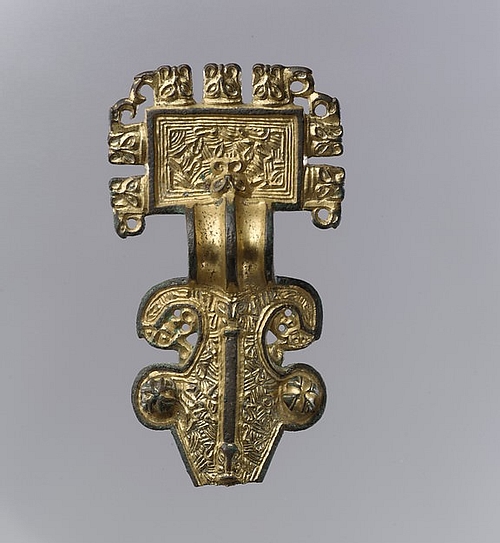
Seaxburh was succeeded by her son Aescwine (r. 674-676 CE) who defeated Mercia at the Battle of Bedwyn in 675 CE and reclaimed some of Wessex's former standing. His uncle Centwine (r. 676-685 CE) succeeded him and continued the struggles with Mercia until he retired and was succeeded by Caedwalla (r.685-688 CE). Caedwalla conquered the sub-kings of Wessex and reunited the kingdom.
He engaged in a number of successful military campaigns, taking Sussex, Surrey, the Isle of Wight, and Kent. Although unbaptized, he clearly aligned himself with the Christian church and forced the conversion of pagans in the lands he conquered. He destroyed the pagan population of the Isle of Wight, massacring those who would not convert and, possibly, even those who had. He abdicated the throne in 688 CE in order to travel to Rome to be baptized and die in the city where, it was believed, Christians had easier access to heaven.
Wessex devolved into conflict after Caedwalla left as the sub-kings reasserted themselves. Order was restored by a nobleman named Ine (r.688-726 CE) who is also the first West Saxon king to formulate and issue a law code. His laws distinguished between the people known as the English and those called Britons and specified rights for the accused in a crime as well as addressing damages to victims from various crimes or carelessness.
Ine had inherited a large and powerful kingdom and succeeded in not only maintaining but expanding it. He was succeeded by Aethelheard (r. 726-740 CE) who steadily lost power, prestige, and land to Mercia until he was succeeded by his brother Cuthred (r. 740-756 CE) who defeated the forces of Mercia in 752 CE. Cuthred re-established the primacy Wessex had under Ine but this was eroded under the reigns of Sigeberht (r. 756-757 CE) and Cynewulf (r. 757-786 CE).
Under the reign of Beorhtric (r. 786-802 CE), Wessex prospered through negotiations and an alliance with Mercia. When Cynewulf died, Beorhtric's claim to succession was challenged by the nobleman Egbert but King Offa of Mercia (r. 757-796 CE) supported Beorhtric and Egbert was driven into exile. Beorhtric then married Eadburh, daughter of King Offa, and the Mercian king ceased hostilities and supported his reign. Beorhtric died in 802 CE, poisoned by his wife, and Egbert took the throne.
King Egbert of Wessex
Egbert had been in exile since c. 789 CE, living in Francia which at that time was ruled by Charlemagne. Charlemagne did not care much for Offa and is said to have been outraged when the Mercian king suggested an alliance which would be sealed by the marriage of Offa's son Ecgfrith to one of Charlemagne's daughters. It is probable that Charlemagne supported Egbert's bid for the throne of Wessex and, as champion of the church and then Holy Roman Emperor between 800-814 CE, would have had more than enough power to place him on the throne; which is probably what happened in 802 CE when Beorhtric died.
Mercia, at this time, had the upper hand in the region and Egbert may have wisely decided to keep a low profile while building up his army and resources. Little is recorded of the first 20 years of his reign but in 825 CE he defeated the armies of Mercia under their king Beornwulf (r. 823-826 CE) at the Battle of Ellandun (also given as Ellendun). This victory broke Mercian supremacy and Egbert swiftly annexed the Mercian territories of Essex, Kent, Surrey, and Sussex; Wessex was now the most powerful kingdom in the region.
In 826 and again in 827 CE the Mercians tried to win back their territories but without success. Beornwulf was killed in battle in 826 CE and, to prevent political support for future Mercian campaigns, Egbert installed his son Aethelwulf as sub-king of the Mercian territories he'd taken after Ellandun. In 829 CE the Kingdom of Northumbria submitted to Egbert and by the time of Egbert's death he was referred to as `Ruler of Britain' by the Anglo-Saxon Chronicles.
Aethelwulf of Wessex
Egbert was succeeded by Aethelwulf (r. 839-858 CE) who defended his kingdom from Viking attacks while also managing the affairs of state over a considerable amount of land. Aethelwulf was known for his deep religious piety and consideration of others and seems to have been especially adept at listening to the suggestions of his counselors and proceeding thoughtfully; as opposed to earlier rulers who appear to have more or less decided policy on their own.
Aethelwulf married Osburh, daughter of Oslac (Aethelwulf's butler and confidante) and they had six children, five sons and one daughter. According to Asser (the biographer of Alfred the Great, died c. 909 CE), Osburh was a pious, intelligent, and literate woman who impressed upon her children the importance of education. She was influential in shaping the mind of her youngest son Alfred whose reign would be characterized as much by his educational and social reforms as by his military victories over the Vikings.
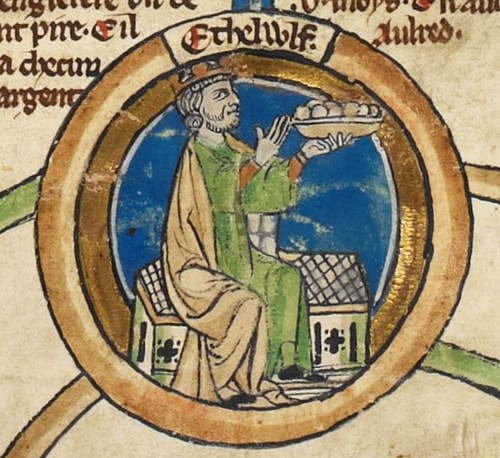
The Vikings began their incursions into the region in c. 830-850 CE and became a serious threat during the reign of Aethelwulf's sons Aethelbald (r. 855-860 CE) and Aethelberht (r. 860-865 CE). The next youngest brother, Aethelred (r. 865-871 CE) bore the brunt of Viking invasions and struggled to maintain his kingdom with the assistance of his younger brother Alfred.
Alfred the Great
When Alfred came to the throne this struggle would continue until his victory over the Viking forces at the Battle of Eddington in 878 CE and the subjugation of Viking London in 886 CE. Following this victory, he devoted himself to reforming the educational system, laws, military, and infrastructure of his kingdom. Scholar C. Warren Hollister writes:
Like all successful leaders of the age, Alfred was an exceedingly able warrior. But he was far more than that. He was a brilliant, imaginative organizer who systematized military recruitment and founded the English navy, seeing clearly that Christin Europe could not hope to drive back the Vikings without challenging them on the seas. He filled his land with fortresses which served both as defensive strongholds and as places of sanctuary for the agrarian population in time of war. And gradually, as the Danes were rolled back, new fortresses were built to secure the territories recently reconquered. Alfred clarified and rationalized the laws of his people, enforced them strictly, and ruled with an authority such as no Anglo-Saxon king had exercised before his time. (128)
Alfred arranged the marriage of his daughter Aethelflaed to Aethelred, Lord of the Mercians (r. 881-911 CE), securing a peace with Mercia which was mutually beneficial. Aethelflaed would later rule Mercia (911-918 CE) and act cooperatively with her brother Edward the Elder (who succeeded Alfred) to neutralize Viking raids and improve the infrastructure of both regions.
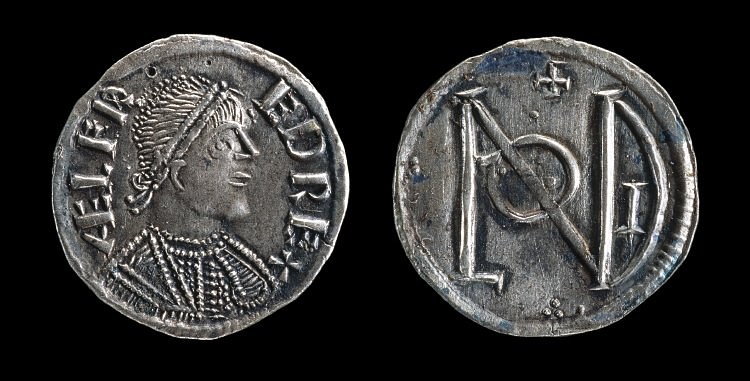
Aethelstan & the Kingdom of England
Edward sent his young son Aethelstan to Mercia in c. 900 CE to be raised and educated at his sister's court. Aethelstan grew up in Mercia and engaged in military campaigns with Aethelred and then, after his death, under the direction of Aethelflaed. Although it is possible that Aethelstan was at first tutored by John of Saxony (a monk Alfred had brought to his court c. 885 CE to help with educational reform and translations), there is no doubt that his primary teacher from c. 900 CE forward was Aethelflaed and the teachers she employed at her court.
When Aethelflaed died in 918 CE, her daughter Aelfwynn succeeded her but was deposed by Edward who claimed Mercia for Wessex. The Mercians had become fond of Aethelflaed, honoring her with the title Lady of the Mercians, and opposed Edward's removal of Aelfwynn. Aethelstan, however, was a familiar figure at court and at this time acted as a kind of mediator between his father and the Mercian nobles.
Aethelstan was chosen as king of Mercia and then succeed Edward in 924 CE to become King of the Anglo-Saxons. The foundation laid by Alfred, Edward, and Aethelflaed in the region, as well as alliances forged elsewhere, provided Aethelstan with security and resources which enabled him to expand his territory and become the first King of the English in 927 CE. He campaigned in Scotland in 934 CE, claiming it as his own, and subdued other regions either through military strength or negotiations. In 937 CE he defeated a coalition of forces from Britain, Ireland, and Scotland at the Battle of Brunanburh and consolidated his lands as one unified kingdom which eventually became Britain.
Wessex in Vikings & Legacy
The importance of Wessex in British and European history cannot be underestimated. The region is the undisputed birthplace of Britain owing to the reforms of Alfred the Great and the institutions and policies he created, including the peaceful relations established with Mercia after centuries of animosity and warfare.

The conflict between Wessex and Mercia is featured in the TV series Vikings and centers on a fictionalized Mercian queen named Kwenthryth (played by American actress Amy Bailey) who asks for Wessex's help in regaining her kingdom. Kwenthryth is an amalgam of three historical characters: Cwenthryth, daughter of Coenwulf of Mercia (r. 796-821 CE), about whom little is known other than she was Abbess of the parish village of Minster-in-Thanet; the Mercian queen Cynethryth (c. 798 CE), wife of the king Offa and mother of Ecgfrith of Mercia (r. 796 CE); and her daughter Eadburh who poisoned king Beorhtric.
The scheming and conniving elements of Kwenthryth in the TV series are drawn from legends surrounding Cynethryth which portray her as duplicitous from her early arrival in Mercia and responsible for assorted betrayals and assassinations. The character does not seem to have anything in common with the historical Cwenthryth other than the name but does draw on the legendary Cwenthryth from the 12th century CE story of the murder of St. Kenelm where she is the scheming sister who plots her brother's death. Aspects of Eadburh's story are used along these same lines in developing Kwenthryth. The political intrigues surrounding the Kwenthryth character are also fictionalized but draw on actual conflicts of the Mercian ruling class.
Further historical deviations in the depiction of Wessex include the character of Judith (played by English actress Jennie Jacques), wife of Aethelwulf, who is a princess of Northumbria in the show but was actually a daughter of the Holy Roman Emperor and King of West Francia Charles the Bald (r. 843-877 CE) and was only a teenager when she married the historical Aethelwulf. No mention is made of Osburh in the show and Alfred the Great's parentage is completely fictionalized (although his frailty in youth and poor health are addressed).
King Egbert (called Ecbert in the show and played by English actor Linus Roache) is depicted as almost completely self-serving and manipulative in the series, a characterization drawn from the historical Egbert's initiatives in consolidating his kingdom but without any detailed historical basis. Aethelwulf (played by actor Moe Dunford) shares the religious piety with his historical counterpart but his temper, association with Kwenthryth, and relationship with Judith are all fictionalized.
The series consistently draws on various historical elements to present a cohesive narrative and this is as true for the depiction of Wessex as any other aspect of the show. Although not always historically accurate, the series succeeds in portraying the importance of Wessex during the time of the Viking raids and the part it would play in the evolution of Britain.

